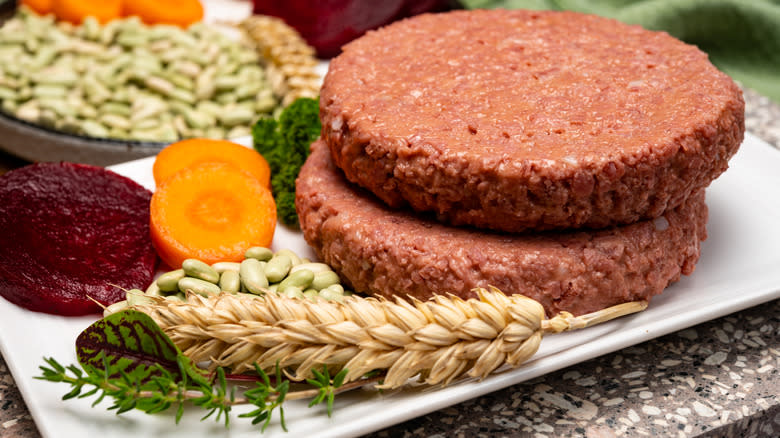Why Fake Meat Is Making It Harder For Some Vegetarians To Dine Out

Fake meat products like Impossible and Beyond, which were designed to look and taste like meat, are on the rise. In fact, you've most likely seen these innovative imitation meat products on restaurant menus in your town, including at fast food chains, casual sit-down spots, and even upscale dining destinations. In addition to adding these "meat patties" to the menu, restaurants are also swapping out previous veggie options, like black bean burgers, for new fake meat products.
While at first glance, this makes it seem like vegetarians are gaining more options at restaurants, the growing popularity of these products is actually making it more difficult for some vegetarians to dine out. It seems counterintuitive, right? Well, I've been a vegetarian for 30 years, and unfortunately, many vegetarians and vegans dislike the taste and texture of meat, myself included. As a result, adding products that mimic the real thing while replacing other flavors leaves many of us empty-handed.
Read more: 25 Most Popular Snacks In America Ranked Worst To Best
Fake Meat Is Becoming More Popular And More Realistic

Soy-based meat substitutes have been around for a long time. However, it wasn't until recently that they started tasting similar to real meat. Early renditions of meat substitutes, like Gardenburger, were shaped into patties resembling meat, but they didn't look like beef and certainly didn't have the same flavor. The same goes for early chicken substitutes, like Chik'n, even though they managed to do a better job of resembling and feeling like the real thing.
Now, plant-based meat brands, like Beyond and Impossible, have successfully created imitation meat products that look and taste just like meat. Finding imitation beef, sausage, chicken, pork, fish, meatballs, and even jerky is becoming easier every day, and lots of people love them. This new range of products is nutritionally dense, environmentally sustainable, and typically contains less saturated fat when compared to real meat. So when you think about it, they have lots of potential benefits, and their rapid increase in popularity isn't really all that surprising. Considering how well fake meat is being received, restaurants are rushing to add it to their menus, too.
Many Vegetarians Don't Like The Taste Of Meat

Even if it's fake, the taste of imitation meat is unappealing to many people who practice a plant-based diet. People who are transitioning between eating meat and slowly eliminating it from their diet may find imitation meat comforting, but for me, this makes no sense. Why would I want to consume something that tastes like meat if I don't eat it regularly? Also, I've never liked the taste of meat, so why would I start enjoying it now? While this isn't the case for all vegetarians, it is more common than you probably think.
Vegans and people who have been vegetarian for an extended period of time are often more prone to disliking the taste of meat. A great example of this can be found in India. Indian food is primarily plant-based and always has been. In addition, Hindus consider cows sacred, and many Indian people wouldn't dream of eating beef. So, if you haven't experienced the flavor of beef or meat in many years or ever, it's not uncommon to stop craving or even enjoying the thought of eating it again. This is where the disconnect exists between plant-based diets and realistic-looking fake meat products, and unfortunately, it's a pretty big one.
The Look And Texture Of Meat Is Also Unappealing To Many Vegetarians And Vegans

You've probably heard a picky eater talk about how a particular texture, like slimy or mushy, is enough to turn them off from certain foods. Well, the same thing is true for many vegans and vegetarians when it comes to the texture and appearance of imitation meat products.
As a lifelong vegetarian, my brain doesn't want to comprehend that a fake meat patty is not actually meat. This sentiment is particularly true with products that take extra steps to make them appear like they have blood in the "meat." I know it is not really blood; it is actually beet juice or soy leghemoglobin, which mimics the protein found in meat that causes it to be red. Even so, the appearance of blood in fake meat burgers is more than enough to make these products entirely unappealing for me. I know I'm not alone in this, either. During my decades as a bartender and server, I encountered many vegetarians and vegans who shared my feelings about food that looks and feels "too real."
Restaurants Are Adding More Vegetarian Menu Items, Just Not For All

Thanks to the influx of people switching to plant-based diets and healthy meat alternatives, restaurants are adding more vegetarian options to their menus all the time. However, they often involve imitation beef products like Impossible and Beyond. From fast food joints to nationwide chains to neighborhood spots, you can find it quite easily. Seafood restaurants and sushi places are also adding fake fish to their menus at increasing speeds. I'm not talking about imitation crab either (which is actually fish). Amidst backlash from meat-eaters, Cracker Barrel even has a vegan sausage.
The addition of realistic fake meat to restaurant menus makes many people who prefer plant-based options rejoice, but others find it misses the mark. Not only do imitation meatballs and burgers not appeal to everyone, but they also tend to cost significantly more than dishes made from vegetables. While restaurant menus appear to be increasingly more accommodating to vegans and vegetarians, for many, this simply does not ring true.
Vegetarian Preparation Isn't Always Guaranteed

Suppose for a moment that realistic fake meat isn't a turn-off for some vegetarians. Even so, plenty of places that now have veggie burgers and other imitation meat products are not equipped to prepare these foods in a vegetarian manner. Whether it's a lack of extra space or the lack of foresight in considering plant-based needs, restaurants have been known to cross-contaminate fake meat with real meat in the kitchen. As a result, many vegetarian menu items can be deceiving.
If you're visiting an upscale dining destination, you can pretty much guarantee that the chefs will take the necessary precautions to prevent cross-contamination between vegetarian food and meat. However, this is not the case in more casual eateries, particularly fast-food restaurants. I guess you get what you pay for, right?
One example of deceptive vegetarian food is Burger King. Its website clearly states that the plant-based Whopper is cooked on the same broiler as the original Whopper to infuse it with authentic flavor. They also share the same cooking utensils and, therefore, are not truly vegetarian. Another example of this is Chick-fil-A and its crispy pressed cauliflower sandwich, which the company trialed in the first half of 2023. I almost went to get one because it wasn't supposed to taste like chicken. After doing some research, I quickly learned it wasn't a real option for vegetarians. Because it contains milk and eggs, Chick-fil-A doesn't designate vegetarian cooking surfaces for this sandwich.
Fake Meat Products Are Replacing Thoughtful Vegetarian Menu Items

Like anyone, I spent years exploring restaurants in various neighborhoods to find my favorite spots. My personal list of the best restaurants to order yummy, nutritional vegetarian cuisine has served me for many years, but the rise of fake meat has drastically changed my options at these same places. Sure, some spots are simply adding realistic imitation meat products to their menus, which is great at face value. However, many restaurants are taking it a step further and replacing long-standing plant-based menu items with fake meat options, making it more difficult for vegetarians like me to enjoy.
For example, I love a good veggie burger. Many of my favorite places used to make thoughtful handmade patties from black beans or grains like quinoa, but now, the majority of them have switched homemade patties out for Impossible and Beyond burgers. In addition, restaurants that used to feature sandwiches, tacos, and more made from soy-based proteins like tempeh and tofu or mushrooms are also being replaced. So, while it may seem like vegetarians are gaining ordering potential, if they don't like the taste and texture of meat, their choices are actually being reduced.
Read the original article on Tasting Table.

